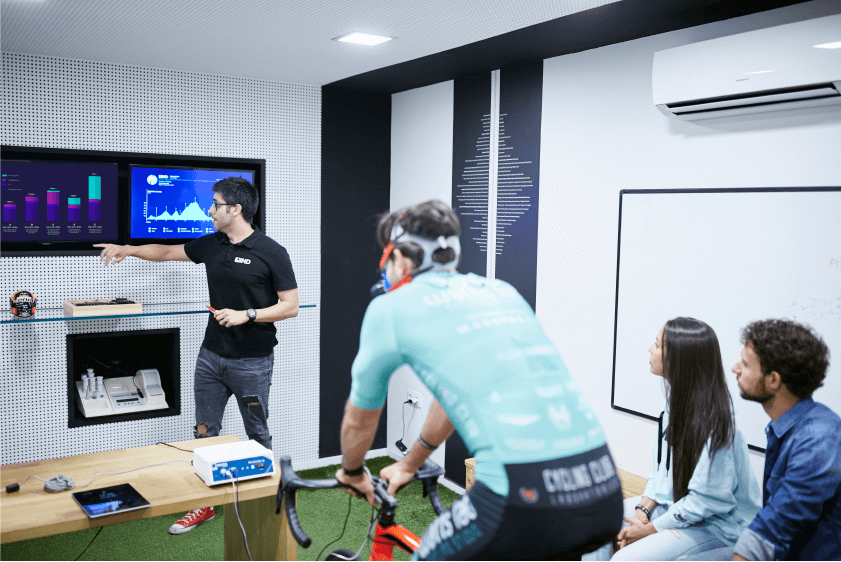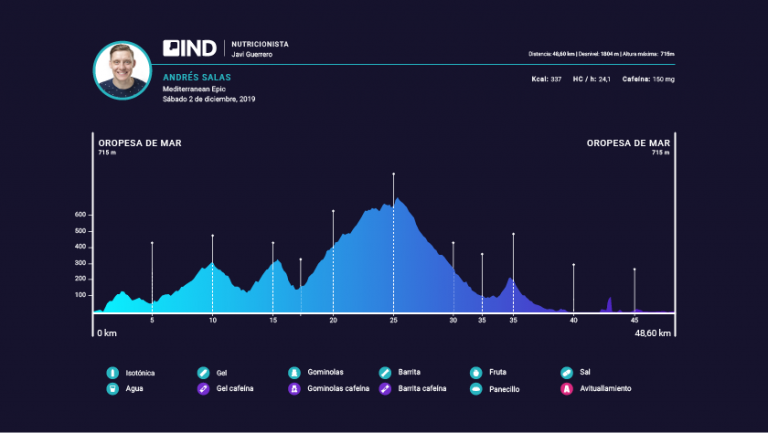You may never have seriously considered why have a sports nutritionist .
As human beings, we are always looking for a unique solution that makes life easier for us. It is understandable. That is why there are countless types of diet that have been invented as a result of diet culture.
The science of nutrition, and even more so in the sports field, has many nuances and variables to consider. The beauty of this science is precisely that and the key is knowing how to use all those variables that define you.
You are not a machine with isolated parts that must be fed with one type of fuel or another to work well. The story is not that simple. Nor is there a perfect diet for everyone, not for all runners, not even for all men between 35-40 vegetarians who are going to run the Valencia Marathon.
Dietary Reference Intakes (IDR) , vitamins and minerals, balanced diet, sugar bad, not fat … Most of the information that we find in guides or blogs on the internet are not designed for your specific objectives or adjusted to your requirements. And that’s why we are here, so you can meet your nutritional expectations and stop guiding yourself by what you don’t need.
The power supply must be personalized inside and out . If not planned well, it would end up as wet paper in a drawer. And this story is not about drawers or papers. It’s about real life, about effectiveness and about the many benefits that a well-planned diet can bring you.
Why a sports nutritionist? Well, because …
1. You will know how to arrive with energy to each workout
The nutritional needs of an athlete are different depending on the time of training or the season. Controlling energy (Kcals) and the distribution of macronutrients (proteins, carbohydrates and fats) is crucial for your body to arrive at training with sufficient energy and resources. If you are “closing the peak” to lose weight, but then you never feel like training, you do it halfway or you get injured … it is not worth it.
2. It will manage your supplementation in a personalized way
Supplements are a field with too many promising claims and options, with good marketing and publicity.
We advise you on which supplements are suitable for you and which ones are not face achieve your goal: brands, formats, why take it , when to take it, in how much quantity, for how long …
3. It will improve your body composition
The balance between having enough energy to always train hard and losing fat is very difficult if you don’t calculate your needs and measure your amounts. To gain muscle mass without increasing fat or tell you. Weight is not such an important indicator of athletic performance. It is more important how you have distributed that weight in muscle, fat, bone, residual …
4. Manage your nutritional strategy for competitions
Tappering week, previous days, hydration, competition days, refreshments, how do I carry it, what do I ask at the hotel, stomach closed by nerves …

5. He will understand you because he is also an athlete
In IND, as nutritionists sports that we are, we are passionate about sport, we have all competed and we know what it is like to be behind a starting line, in a qualifying round, in the middle of a match or on the couch injured.
6. It will adapt your nutritional plan to your schedules
It is essential to synchronize planning with your sports routine to control the number and type of meals. First, because order suits your body, but that is very good. But also, because you have to take into account your digestion, your rest, your rhythms of life, your logistics to buy, cook, your work, family conciliation, etc. If you have baked sea bass in your plan to eat, but you are driving an ambulance at noon … difficult.
7. It will make it very easy and tasty
Your nutritionist should not complicate your life but enrich it. The life of an amateur athlete is already stressful and changeable enough. With the help of increasingly intelligent software, a sports nutritionist is able to manage everything you need and adapt it to your tastes, level and time to cook, intolerances, food consciences, pathologies, family conciliation, stress, rest, eating habits or of life, where you buy, if you have a bus or if you need meals from Monday to Friday to be easy to carry in a tupper.

8. You will recover better after training or competing
During the effort made when we train or compete we rob and break many resources from the body. This expense needs to be recovered through nutrients and rest, because it is in recovery that improvement and adaptation occurs.
Remember: “Your training ends when you give back to your body what you have taken away.”
9. You will learn how to achieve physiological adaptations
We study your situation to get the most out of it. Improve performance with nutritional strategies such as intermittent fasting and or ketosis can work, but only if it is done in a safe and controlled way.
10. You will know how to maintain performance in a training or competition
In many workouts you will need to eat or drink to maintain performance . Likewise, the personalized management of the aid stations is another important task of the sports nutritionist.

11. It will adapt your nutritional strategy to your sport
Not only in terms of the physical capacity to train (if it is intense continuous, intense intermittent, resistance, strength, etc.) but also due to its own logistics and characteristics. For example: in martial arts for weight cuts; in contact and team sports due to the amount of blows and inflammations that must be recovered…; guring strength sports for muscle recovery needs; in endurance sports because of the importance of optimizing body composition and maintaining the rhythm for the necessary time …
12. It will help you understand why you are doing
It is not about giving instructions. A good sports nutritionist will always try to explain the reasons for their decisions, make you understand the effect that food has on the body and involve you in each of the changes. In addition, we want to advise you with the recipes and with the purchase, help you find professionals or material that will help you performance and, sometimes, simply listen to you.

13. It will help you prevent or recover injuries
Nutrition has to be adjusted to your energy expenditure. A correct, quality diet, sufficient in energy, protein and micronutrients is key not only to prevent injuries, but also to recovery or to minimize collateral effects.
14. Readjust your nutritional plan when there are major changes
Your day to day is changing. That is why it is essential that a nutritionist with the help of technology is able to readjust your planning in the event of any unforeseen event that may alter your routine. For example, if you haven’t been able to train that week, if you have had a three-day work trip or if you usually skip breakfast and lunch. The sum of details is everything.
In addition, we assess your progress to ensure that every day you are one step closer to your goals.

15. For your health
A good sports nutritionist does not conceive of performance without health, or the other way around. Not even with a professional. Do not think that an elite athlete is not healthy and that they put “shit” to perform without being healthy. Not so.
A good nutritionist will improve your performance by improving your health. And these are two investments with more than guaranteed profitability.
In short, a sports nutritionist exists by and for you. If we are important, it is because you are important.
You can take a look at our services with online nutritionist for more information.

